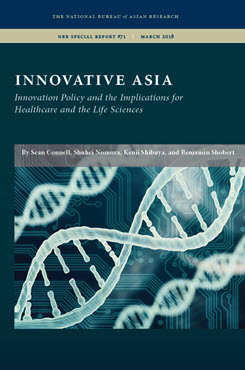Exploring the Context for Innovation Policy in Japan and South Korea
This essay explores Japan’s and South Korea’s national innovation systems, considers potential implications for the two countries’ economic policy agendas, and examines related areas for engagement with the U.S. that could enhance national and global environments for innovation.
EXECUTIVE SUMMARY
This essay explores Japan’s and South Korea’s national innovation systems, considers potential implications for the two countries’ economic policy agendas, and examines related areas for engagement with the U.S. that could enhance national and global environments for innovation.
MAIN ARGUMENT
Innovation is critical for future economic growth and job creation in Japan and South Korea. The two countries are global leaders in innovations integral to established and emerging high-tech industries. However, characteristics of their national innovation systems may be factors contributing to recent strains on their economic growth. Addressing these challenges and fostering the most conducive domestic environment for innovation requires progress on a broad set of structural reforms that have long been on the policy agenda in both Japan and South Korea. In addition, because innovation policies increasingly have global impacts as economic integration across national borders accelerates, both countries should prioritize cooperation with the U.S. in advancing trade and other policy frameworks that facilitate innovation.
POLICY IMPLICATIONS
- Continued progress by Japan and South Korea in advancing long-term, comprehensive structural and regulatory reforms that will enhance their domestic environments for innovation should remain an economic policy priority.
- Both countries should fully implement trade agreements to reap the benefits of provisions that will foster domestic and global environments for innovation, including strong intellectual property protections and elimination of non-tariff market barriers.
- Japan and South Korea should build on recent bilateral dialogues and frameworks with the U.S. focused around innovation-driven industry sectors to address global challenges and explore new opportunities for engagement. As part of this effort, they should explore potential approaches to increase engagement among subnational actors, including local governments, businesses, universities, and others with a role in shaping innovation ecosystems.


